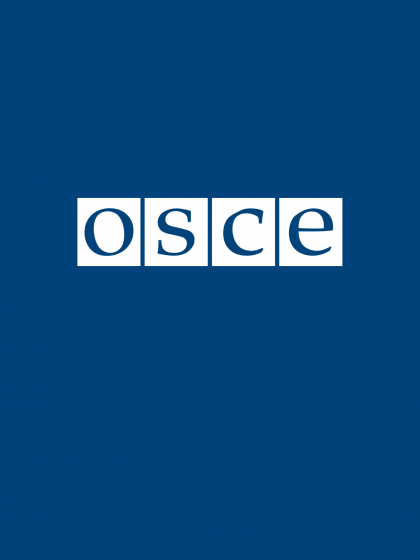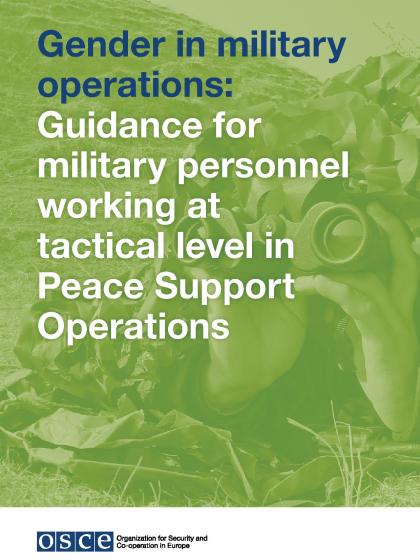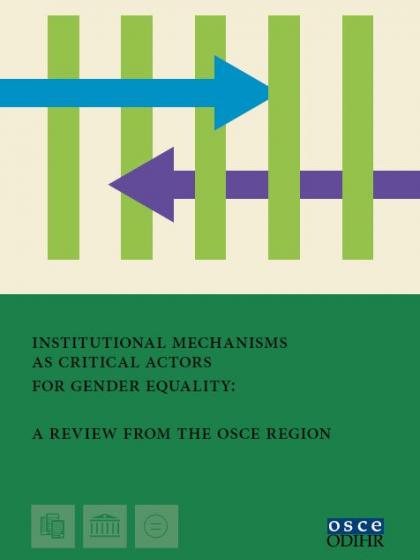Publications
Understanding the Role of Gender in Preventing and Countering Violent Extremism and Radicalization That Lead to Terrorism- Good Practices for Law Enforcement
Publishing date: 26 April 2019
Content type: Guide / manual / handbook
Where we are: OSCE Secretariat
What we do: Countering terrorism
Publisher: Organization for Security and Co-operation in Europe
This handbook was created to provide guidance to law enforcement and security actors, including policymakers, on how to better understand gender dynamics in VERLT. The publication aims at supporting and increasing gender-sensitive responses and policies, and reflects the OSCE’s commitment to gender mainstreaming as an integral part of preventing and countering VERLT.
Hate Crime Prosecution at the Intersection of Hate Crime and Criminalized ‘Hate Speech’: a Practical Guide
Publishing date: 15 November 2024
Content type: Guide / manual / handbook
Where we are: OSCE Office for Democratic Institutions and Human Rights
What we do: Tolerance and non-discrimination
Publisher: Organization for Security and Co-operation in Europe
This guide supplements existing ODIHR guidance on prosecuting hate crime by outlining the legal and conceptual differences between hate crime and criminalized ‘hate speech’; outlining the consequences of misapplying ‘hate speech’ provisions to prosecute hate crime, providing practical guidance on how to avoid this; and making recommendations on how to improve practice at the national level. It does not provide guidance on how to handle individual cases of any form of criminalized ‘hate speech’, nor does it suggest what forms of behaviour should be criminalized.
Decoding Crypto Crime- A Guide for Law Enforcement
Publishing date: 14 March 2025
Content type: Guide / manual / handbook
What we do: Economic activities, Good governance
Publisher: Organization for Security and Co-operation in Europe
The Organization for Security and Co-operation in Europe (OSCE) is proud to release a practical resource designed to empower law enforcement officers, prosecutors, and stakeholders in tackling cryptocurrency-related crimes. The guide "Decoding Crypto Crime: A Guide for Law Enforcement" simplifies complex concepts like blockchain technology and virtual assets, offering best practices for investigating common crypto crimes such as investment scams, extortion, and phishing.
Creating Mentor Networks in the OSCE Region: A Practical Roadmap
Publishing date: 9 June 2015
Content type: Guide / manual / handbook
Where we are: OSCE Secretariat
What we do: Gender equality
Publisher: Organization for Security and Co-operation in Europe
A joint publication by the OSCE and KVINFO designed as a “how-to” manual for creating a mentoring network by providing operational guidance, concrete examples and samples of useful documents for mentors and mentees.
Quick Guide on Preventing and Addressing Sexual and Gender-Based Violence in Places of Deprivation of Liberty
Publishing date: 24 September 2024
Content type: Guide / manual / handbook
Where we are: OSCE Office for Democratic Institutions and Human Rights
What we do: Human rights, Gender equality
Publisher: Organization for Security and Co-operation in Europe
This is a quick reference book containing practical information about the problem of sexual and gender-based violence (SGBV) in criminal justice facilities. It proposes various safeguards to prevent and respond to such violence.
ODIHR Publications: 2022
Publishing date: 9 January 2023
Collections: ODIHR Publications
Content type: Brochure
Where we are: OSCE Office for Democratic Institutions and Human Rights
Publisher: Organization for Security and Co-operation in Europe
ODIHR’s publications, factsheets, and practical guides are vital tools to assist all those working to strengthen democracy and human rights across the OSCE. The Office's 2022 publications covered a wide range of topics, including human trafficking, parliamentary integrity, the right to peaceful assembly, election observation, promoting the political participation of people with disabilities, combating hate crime, Roma inclusion, and many more. Others were translated for the first time into other languages of the OSCE region.
Practical guide for justice professionals "Crime victims' rights to rehabilitation and compensation"
Publishing date: 13 September 2022
Content type: Guide / manual / handbook
Where we are: OSCE Mission to Moldova
What we do: Human rights, Rule of law
Publisher: Organization for Security and Co-operation in Europe
This Guide has been developed within the framework of the project implemented by the OSCE Mission to Moldova "Strengthening policies, measures and access to damage recovery to support victims and prevent exploitation on both banks of the Dniester River". The basic objective of the Guide is to raise awareness among the judiciary on the application of the restorative justice model and to contribute to the implementation of the provisions of the normative framework in accordance with the Law No. 137/2016 on the rehabilitation of victims of crime, in order to protect and ensure respect for their rights and legitimate interests. The guide is a materialized continuation of the seminars for prosecutors and judges in the field, organized by the National Institute of Justice in partnership with the OSCE Mission to Moldova. This Guide is intended to be used as a specialized training support for the National Institute of Justice's audience, as well as in the process of continuous professional training of judges, prosecutors and lawyers in the segment of victims' rights protection and restorative justice. The Guide is available in Russian and Romanian.
Gender in military operations: Guidance for military personnel working at tactical level in Peace Support Operations
Publishing date: 31 October 2018
Content type: Guide / manual / handbook
Where we are: OSCE Secretariat
What we do: Conflict prevention and resolution, Gender equality
Publisher: Organization for Security and Co-operation in Europe
This publication is the newest addition to the OSCE’s collection of toolkits and guidance on integrating a gender perspective into efforts to build peace and security. It illustrates how a gender-sensitive approach to operational practices can benefit conflict prevention, crisis management and post-conflict rehabilitation and provides concrete suggestions on enhancing women’s participation in peace operations.
Educational package for strengthening the capacity of youth-led civil society organisations, organisations for youth and local youth offices for social inclusion of young people from vulnerable groups
Publishing date: 17 December 2020
Content type: Guide / manual / handbook
Where we are: OSCE Mission to Serbia
What we do: Democratization, Youth
Publisher: Organization for Security and Co-operation in Europe
The educational package before you builds upon lessons learned and insights gathered through the wider consultative process and initiatives implemented, aiming to offer possible practical steps toward a more inclusive youth policy and to promote the common values of the main youth policy actors in Serbia. It consists of three parts: the first chapter deals with the general legal and regulatory framework of the Republic of Serbia in terms of anti-discrimination; the second chapter gives a closer look at the standards in this context that exist within the scope of youth policy, focusing on the practices of the three pillars of youth policy; the third chapter offers practical approaches and examples of good practice for inclusion of young people from vulnerable groups. The publication is available in Serbian language.
Institutional Mechanisms as Critical Actors for Gender Equality: A Review from the OSCE Region
Publishing date: 16 November 2023
Content type: Guide / manual / handbook
Where we are: OSCE Office for Democratic Institutions and Human Rights
What we do: Democratization, Gender equality
Publisher: Organization for Security and Co-operation in Europe
Institutional mechanisms for the advancement of women and gender equality have a unique potential for making women’s and men’s lives better and, more generally, making democracies stronger, more resilient and egalitarian. In these challenging times for democracy, institutional mechanisms play an important role in preventing the reversal of gender equality in practice.










